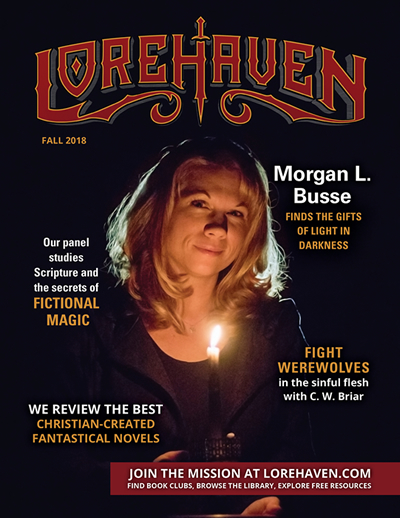Engaging the Magical Spellcraft of Stories
E. Stephen Burnett: Welcome back to Lorehaven magazine’s Roundtable!
In this feature, Christian fantasy fans explores dangerous ground at the corner of our God-given faith and imagination. As we enjoy and discern these topics, we want to follow the apostle Paul’s truth in the book of Galatians, such as Galatians 5:13:
“For you were called to freedom, brothers. Only do not use your freedom as an opportunity for the flesh, but through love serve one another.”
Each person on our panel professes biblical faith in Jesus Christ. Each friend also embraces Jesus’s call to holiness. Yet each person also has different views on how we practice holiness in our everyday lives, and in the stories we enjoy as fans.
In our last issue, we explored the topic of fictional language, like “bad words” and misuses of the Lord’s name in a story. Now we move into a similarly controversial theme. But among some Christians, this theme can be even more controversial. And it’s unique to fantasy and similar genres: the theme of magic in fiction.
With Jesus’s help, and with his glory, grace, and truth (John 1:14) in mind, we’ll explore this topic with love and respect for one another.
First, let’s suggest a definition. Here’s what we mean by the term “fictional magic”:
“Fictional magic is defined as a work of fiction that includes supernatural or miraculous events, or practices, that are not common to our real world. These events or practices can have different origins—such as power from a divine source, specially gifted humans, or a series of different natural laws that humans (or human-like characters) can use for different purposes.”
Let’s explore several issues related to fictional magic and how fans can address this.
1. How have you, as a fan, viewed fictional magic?
Parker J. Cole hosts a radio show and writes romance as well as speculative novels.
Marian Jacobs writes about Jesus, monsters, and spaceships. Her work is featured at Desiring God as well as Stage and Story. She and her family live near Houston.
Ronie Kendig has written dozens of published military suspense, fantasy, and science fiction novels.
Robert Treskillard writes Arthurian fantasy novels based in Celtic mythology.
Marian Jacobs: I have always viewed and engaged with magic as merely fictional and fun. I can’t remember a time of ever being tempted to sin because of fictional magic. That said, my views have changed after I’ve met more fantasy fans who have found this tempting. Although I still think censorship of magic in literature, games, etc., is a poor solution to a heart problem, I’m a little less baffled by parents who remove all fictional magic from their home.
Robert Treskillard: As a reader and as a fan, I work hard to think of non-occultic magic in terms of an ancient way of trying to understand things that were beyond their time. As such, I try to not worry any more about it than I might new technology in a sci-fi novel. This allows me to read more broadly than I write because as an author I have my own detailed approach and opinions on the subject.
Ronie Kendig: My mother, wanting to honor God in all she did and the children she raised, didn’t allow us to see movies like ET or Star Wars. And I have no grudge against her for that because she sought to honor God in every aspect of her life. Now, my approach to magic systems that I read and create is that as long as I am not going against God’s word, then I am okay. For TV or movies with magic systems, I look at the source of that magic and its purpose. Does it show the triumph of good over evil? Does it show the hero wielding magic with “honor”?
Parker J. Cole: I really didn’t start to have an opinion of magic in anyway until I got into various Christian circles. Growing up, my parents made sure we didn’t do occultic things such as playing tarot cards or calling Dionne Warwick. I knew as I watched TV and movies, I could never do the magic like in the most fabulous movie Willow. I knew I couldn’t fly on brooms or sprinkle fairy dust like Tinkerbell. Why? Because my parents told me Santa Claus wasn’t real, that we went to the Lord for any request, and that there was no such thing as magic. That’s why, when I read stories of magic, I was able to divorce any sort of reality from it.
2. How do you respond to your parents’ views of fictional magic?
ESB: Many of our readers may empathize with the memory of being taught, from childhood, that such things are either suspicious or downright evil. Ronie and Parker, you’ve both shared a very mature response to this, even if you’ve grown in your own grown-up-level approach to fictional magic. I suggest many Christian fans absolutely need to respond in this mature way, as you both have, to the parents or other authority figures in their lives who have forbidden things from them.
If we can accept that fictional magic is messy—and not all helpful or harmful—then we ought to say the same thing of parents of spiritual authority figures.
Parker: You have to come into your own relationship with Christ. My parents were just honest about it. I respect what they did teach us because it gave me a foundation in how to respond. Sure, my response has changed over the years because I’ve heard different things and can lean toward certain aspects with a bit of freedom than I could as a kid. But mom and pops were just doing the best they could with what they knew. Most parents do.
Marian: Growing up, my parents didn’t intentionally teach critical thinking about magic. I was pretty much allowed to watch anything I wanted on TV. But I was still able to glean that there is a difference between fictional magic and magic in the Bible from simple comments about Ouija boards being evil. That was enough for me to steer clear, since I wasn’t tempted by power.
My husband’s parents did censor magic in their home, and I would never say their reasons are “dumb.” They simply think it’s confusing for children and teaches them that evil magic is “fun.” I can respectfully and empathetically disagree with them.
Ronie: Crowd mentality is powerful, so I am glad for the example my mother set to measure what she did and didn’t do against the word of God. My approach to reading and watching is this: I look at the magic’s source, I look at its use in the story, and the motivations of the characters in using that system.
Robert: We really are all coming from different backgrounds. I grew up very ignorant of Christianity with about every other religion represented somewhere in my extended family. I also came from a divorced home and had little guidance on anything growing up because my mom worked and went to school. Needless to say I got into a lot of trouble and didn’t come to faith until I was fifteen. Yet here I am a now empty-nesting homeschool father who had to flip and figure out how to parent my kids in this confusing world. I only have respect for all the other parents out there even if they made different decisions than my wife and I did. We’re all just muddling through doing our best. We used to unconsciously think that if we followed the right “formula,” our kids would turn out well, but we’ve learned that there is no formula. God has us all on a bit of a wild ride and we just need to hold onto him, like Lucy holding onto Aslan’s mane.
3. Does the fictional magic source (like gifted people vs. natural law) make a difference for you?
Ronie: Yes, I think it does because having a source defines that there is something greater than the character, and I do think that’s an important element of the story and mirrors our existence and relationship with God.
If only a character has the magic and it does not have a source, then only the character defines the right and wrong uses of that, and left in a person’s hands, I think that’s pretty tricky or dangerous ground. It is much as our world is today with situational ethics and determination of right and wrong being only through what is “right for you,” and we can see that’s not working out so great in a lot of ways.
Marian: It does make a difference. I think magic, although fictional in this case, is an unreality, it should still convey something about reality. How it does that can vary. But ultimately, all good comes from God. The story doesn’t need to literally talk about God (it can, though) but the magical source should not be the magic wielder. Even if the magic being used doesn’t have a stated source, the person using it should still take a posture of humility in using something that doesn’t belong to them, and which is a power that exists outside of themselves.
Magic can also be a metaphor for the gifts God gives, whether spiritual or physical. When the magician becomes dependent on their own strength and full of pride (in being like God rather than dependent on God), then they have become like the evil magicians in the Bible.
Robert: For my own writing, I have the magic come from objects, such as a meteorite/stone, sword, or fang. But I go beyond that and make it clear that the source is ultimately found beyond the object in good or evil.
And so with that perspective, I understand the concern and danger about having the source of magic come from within an individual. But how is this any different from the Avengers, or the X-Men mutant movies? Or how is that different from any natural ability—one man is very strong and so must learn to use his ability in a God-honoring way?
Parker: I have to go back to the thought that a lot of this stuff wasn’t a big deal to me until I got into these types of circles. Because I knew magic wasn’t real, it didn’t matter what the source was. But I like Marian’s point about how even the unreality should point to the reality. Is the source a Creator with a moral compass? Is it an Infinity Stone made at the Big Bang of the universe? Is it a wand made from the crystallized fire of a dragon’s breath lost in the mountains of Abingna? The source does reflect that reality to a degree.
ESB: For my part, I can enjoy stories with fictional magic sources of any of the three origins, or a hybrid. For example, in Star Wars, the “magic” of The Force is part specially gifted human, part different natural laws. I enjoy this because our heroes are, for the most part, still following a presumed honor/morality standard such that anger, fear, and more lead one to the dark side, while love, respect, and compassion bring one to the light.
In other words, the story may claim that it’s all about “balance” and the magic has no will. But it’s all, one might say, a trap. Plot twist: the story was all about a hero’s journey anyway, and even the “force” that has “no morals and no mind”—that’s a quote from C. S. Lewis—is harnessed for the storyteller’s morals and mind, which are hidden in plain sight.
4. What Scripture texts come to mind about magic?
ESB: I’ll start with Deuteronomy 18. This message by Moses has a lot to say about many topics, but is often quoted about magic only in verses 9–14.
Marian: The two that come to mind are 1 Samuel 28 and Exodus 8.
In 1 Samuel 28, Saul visits the witch at Endor and requests she bring up Samuel’s spirit to direct him, since God wasn’t answering regarding an approaching army. In Exodus 8, Moses strikes the ground with his staff and the dust turns into gnats. That’s the third plague and the first one the Egyptian magicians can’t replicate. At that point they admit, “This is the finger of God.”
Since I think evil magic and biblical miracles both fall under the modern literary umbrella of “magic,” I would say that these passages clearly show that (1) evil magic is real, and (2) God’s “magic” is stronger.
Ronie: Ultimately and biblically, Satan cannot create. He can only pervert, so he takes what God has created and perverts it to his end.
Personally, I really love Isaiah 8: 19–20 (NASB): “When they say to you, ‘Consult the mediums and the spiritists who whisper and mutter,’ should not a people consult their God? Should they consult the dead on behalf of the living? To the law and to the testimony! If they do not speak according to this word, it is because they have no dawn.” I really love that symbolism as well as the admonishment to not seek these things, but to seek God.
Robert: Deuteronomy 18 is one of the reasons why I don’t like Harry Potter. It’s one of my principles that not everyone agrees with. If a role is by nature evil, I believe we should not make a person with that role the hero of a story. Thus the very fact that Harry Potter is a witch is a deal-breaker for me. I know I’ll get a lot of hate mail for saying that, because J. K. Rowling is an excellent author in so many ways and so many love her writing. But my issue isn’t magic per se, but rather the title of “witch.” Note that I have a witch in my own stories, Mórgana, but she is quite evil and I make it very clear that she is a slave of Satanic forces and is suffering for her servitude.
ESB: I’ve written elsewhere about Deuteronomy 18, but mainly about how the occult practices it warns against are very specifically about (1) someone’s intentional choice, (2) based in idolatry, (3) based in a desire to attain revelation from “the divine” (for security, safety, hope for the future). This contrasts strongly with God’s promise to reveal a “final prophet” who alone will speak for God.
Readers should decide for themselves, with help from mature Christians, whether they can enjoy a particular story with magic elements, without facing temptation to idolatrous occult practices.
5. What are some hazards about magic in real life, compared or contrasted with magic in fiction?
Parker: I’ll probably upset someone with this because I know it’s going to cause issues but here it goes: the Word of Faith and the prosperity movement is, for the lack of a better term, the “magic” of Christendom. It’s our version of “the Force.” Instead of faith grounded in the person and foundation of Christ, it’s a force we manipulate based on belief. Instead of God, the eternal one, the uncreated Creator, the one from whom all things exist, being the source of our faith, it is a nebulous force we can activate. Mind you, I am not saying don’t have faith. I’m not even saying we can’t go before God’s throne and be bold in faith. However, faith is not a substance used for activation.
Robert: This is an important topic because the culture we are surrounded with spans both extremes—from atheistic materialism, where the spiritual does not exist, to the full spectrum of neo-paganism. And while spiritual realms in Christian spec-fic novels is critically important to combat the former, if a novel is not carefully written, it could confuse and/or encourage people to explore the latter.
So authors are not just playing with words. Their choices can and will affect people’s viewpoints and maybe even their life choices.
If someone is attracted to what is clearly portrayed as evil and what is clearly shown reaping terrible consequences, then there is really nothing that can be done and their soul is in God’s hands. Christian spec-fic can definitely get past some people’s “watchful dragons,” as C. S. Lewis puts it. But for other readers, the stories might entice those “dragons.”
Ronie: I grew up with a mother who had come from Catholicism and converted to a non-denominational faith. In doing so, she was very—strictly—careful about what influences she allowed into her heart and life, and as a result, she took great care what she allowed her children (me and my brother) to read, see, or watch. She was living to the best of her ability a life in faith and servitude. She wanted to honor God. Where is the fault in that? The Bible warns us over and over to abstain and/or have nothing to do with evil, and she was very protective of what she allowed in.
ESB: I definitely agree with caution, and can see a lot of instances where young Christians overreact—even legalistically—against their parent’s choices.
Still, I think it’s important to acknowledge that yes, sometimes we’ve had moral panics over things among some Christians. (For example, the infamous Onion article about J. K. Rowling supposedly being a practicing Satanist.) I think a lot of people, then, hear about this and assume “Oh, that’s just those evangelicals getting worked up over nothing again.” When in fact, there are very real dangers out there, that are being ignored thanks to the (often exaggerated) cries of “wolf, wolf.”
Robert: That is sad how Christians can often give a knee-jerk reaction to fake news like that, and it gives us a bad reputation. I think about the “Proctor & Gamble” logo tie to Satanism lie that got photocopied and spread far and wide in the 1970s and ’80s. This urban legend just wouldn’t die. I once found it on a bulletin board at college, promptly went into the library and copied a micro-fiche of an article that debunked it and posted it. Took me fifteen minutes and that was without the internet. As Christians we should be the first ones to think and research and verify before we take up a cause.
ESB: When I was a kid, the urban legend was that there were demonic “messages” or aesthetics attached to particular music rhythm. This isn’t something I was specifically raised to believe. But the notion of it was a “meme” in the educational materials and various church cultures. The idea often accompanied anecdotes about, say, the tribal witch doctor who had just gotten saved and who believed that banging the drums awakened the spirits. In addition to being potentially, um, racist, I now wonder why Christians just sort of assumed the “weaker brother” (to whom the music was associated with past religion) was qualified to teach everyone.
Marian: I think you’ve all named most of the myths I would throw out there, so I’ll stick to theory here. Joshua 1:7 comes to mind. “Only be strong and very courageous, being careful to do according to all the law that Moses my servant commanded you. Do not turn from it to the right hand or to the left, that you may have good success wherever you go.” I think this is a kind of commissioning not to be extremists and think that the solution to our problems is doing the exact opposite thing—like Aristotle’s golden mean. I think falling into the vices of excess or deficiency is what creates these myths. But being aware of the temptation to overcorrect produces the virtue of prudence which looks to find a balanced and wise solution to the occult and/or fundamentalism.
6. How can Christians address fictional magic for mature fans versus younger fans?
Marian: As C. S. Lewis said about the Chronicles of Narnia series, “One day you will be old enough to start reading fairy tales again.” As I’ve said before, often unreality can teach us something about reality that we may have never noticed or known before. The beauty of a fairy tale is that it grows with the readers.
Ronie: While teens certainly do not want material dumbed down, authors must consider carefully the content they present in stories to younger minds who are perhaps not as well-grounded or who are newly formed in their faith. They are young, growing minds and hearts, and we should be attentive and protective of that.
ESB: One of my great hopes is to equip younger readers to pursue Jesus as their greatest treasure so that the temptations of fictional magic, e.g. as a means of escape, or to control their own lives, would increasingly bounce right off them. In other words, when Christians express concern about fictional magic (or other content), I usually don’t disagree. But I do tend to be more solution-oriented. I instead think, “Okay, because that’s a concern, how can we help train younger students to grow into the kind of spiritual-superpowered adults who can ‘handle’ riskier content, and themselves train others to do the same?”
Robert: I wrote Merlin’s Blade so I could market it either as adult or as young adult. Some agents only accepted one or the other, and by having Merlin 18, I would tailor the pitch either direction. The same was true of the publishers . . . some just weren’t interested in young adult and vice versa. Which basically means I didn’t dumb down the books, yet I kept them clean. Middle grade would be a whole different audience, however. For novels in the same genre that are for adults, I would use Stephen Lawhead as an example. Definitely for the mature of both spirit and taste.
Parker: Mature fans still want the element of wonder. The older we get, we cease to see wonder in the world, but we do search for it. One of the things that has always bothered me about young adult books is that adults either aren’t there or else act like the stupidest people in the world.
7. How might Christians navigate our different views on this while showing love and respect?
Parker: My way of handling this is to be prayerful about the situation, no matter what it is. To see individuals as individuals who are flawed, trying to be more Christ-like. We have to make sure that what we’re not judging people by a man-made standard. People are quick to throw Bible verses at folks with their own spin, particularly when it comes to sin, whether public or private, and then stand on a pedestal of righteousness.
Ronie: “Eating our own” is not a way to draw others to the Lord. For Christians, we (actions and words) should point to Christ—that is the purpose of being a Christian, to bring glory to God. Which we do by having a relationship with him and honoring him in our words and deeds.
Marian: The Bible is explicit about many things and we should obey and seek to have biblical discernment. Christians who tend towards liberalism can take this too far, exercising their Christian freedom in ways that are not biblical and do not glorify God. Perhaps this is the greater danger for Christian geeks who are tempted to love the world. Yet, in the areas where the Bible is not explicit (such as “Can I read Harry Potter? Should I homeschool my children? Can I be separated from my spouse for the sake of reconciliation?”), these things are made into laws based only on our Christian traditions.
Robert: Our stances and beliefs regarding these matters should neither affect the breadth of our fellowship, nor the reach of our loving-kindness. Too often the very medium of social media encourages us to say things we would never say to someone face to face. Although we have strong beliefs in this area, we should follow the old maxim, “In essentials, unity; in non-essentials, liberty; in all things, charity.” This does not mean, however, that we cannot lovingly share our convictions with each other. We just need to do it in the right spirit and in love.
This interview has been edited for brevity and clarity.











































[…] I share something, usually an article or thought, about the topic. (Such as Deuteronomy 18 Witchcraft: What It Is and Isn’t, or the fall 2018 Lorehaven Magazine issue’s Roundtable feature about fictional magic.) […]
[…] “Engaging the Magical Spellcraft of Stories,” Lorehaven magazine, fall 2018 (available for free subscribers). […]